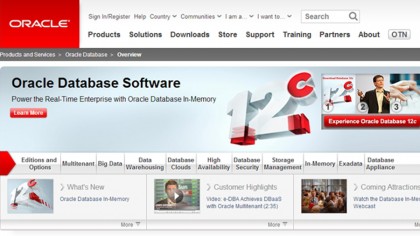Database management software: top four on the market
Platforms for maximising database value

In an increasingly digital world, businesses are creating more and more data. This data can be used to provide insights into how a business is being run and what can be done to improve it. Harnessing and understanding the data that is produced can give businesses a competitive edge and can provide a depth of market knowledge that may not have been previously possible.
In order to capture and use the data that a business produces, it is necessary to have the right tools in place. A database management system (DBMS) is a piece of software or a platform that is designed to help a business maximise the value of the data to which it has access.
A business's DBMS allows it to pull in data from different sources, store the data, sort and catalogue it, have users or other pieces of software "query" the data to find out what snapshots or trends it shows and, if they wish, extract the data for use elsewhere.
There are a huge number of DBMS providers and each product has its own strengths. When choosing a DBMS to use, it is important that a business recognises what its own specific needs are and matches them up with what a DBMS can provide.
Even then, it can still be difficult to navigate the ocean of possible solutions. Fortunately, there is a great deal of analysis of database providers and their products.
Gartner, in particular, offers some clear and insightful analysis concerning the database market. It's annual "Magic Quadrant for Operational Database Management Systems" looks at the evolving operational DBMS market and segments it by those who are leaders in the market, those who are challenging, those who are visionaries and those who are niche players. Providers are judged on the completeness of their vision and their ability to execute it.
This article looks at the four leading DBMS providers in the Gartner "Magic Quadrant for Operational Database Management Systems" and gives an overview of each. It is meant as a starting point from which you can make a decision on which DBMS is best for your business, but there are other providers available that may be well suited to your business.
Sign up to the TechRadar Pro newsletter to get all the top news, opinion, features and guidance your business needs to succeed!
Oracle Database
Oracle is a major technology business with a wide range of products and services to offer. Originally, however, it was primarily a producer of database software and that remains its core business. Indeed, such is Oracle's significance in the database software market that Gartner named it the number one provider of DBMS software in 2013. It holds a larger revenue share of the market than its four closest competitors combined and leads the revenue share of its closest competitor by 28%.

Gartner praises Oracle's broad offering, saying that it is the broadest in the market, as well as its good functionality and solid availability. It suggests that Oracle could improve the public perception of its vision, meaning that consumers are sometimes left to "make assumptions about road maps". It also raises concerns about the extent of Oracle's proprietary features and the value for money of its offerings.
Oracle's DBMS is called Oracle Database and the most recent version of the platform is called Oracle Database 12c. It aims to enable users to make more efficient use of their IT resources and has a multi-tenant architecture that allows users to deploy and manage private database clouds.
It is available in three editions. Oracle Database Express Edition is for use on one computer with a maximum database size of 11GB. Standard Edition One and Standard Edition offer server-installed options for use in small and mid-sized enterprises, respectively.
Oracle Database Enterprise Edition, meanwhile, allows for an unlimited number of databases and unlimited database sizes. Users can take advantage of Data Warehousing, High Availability, Storage Management and Big Data architecture's for 12c depending on the needs of their organisation.
In addition, Oracle says that the Enterprise edition can efficiently manage more data, lower storage costs, improve database performance and it's highly secure.